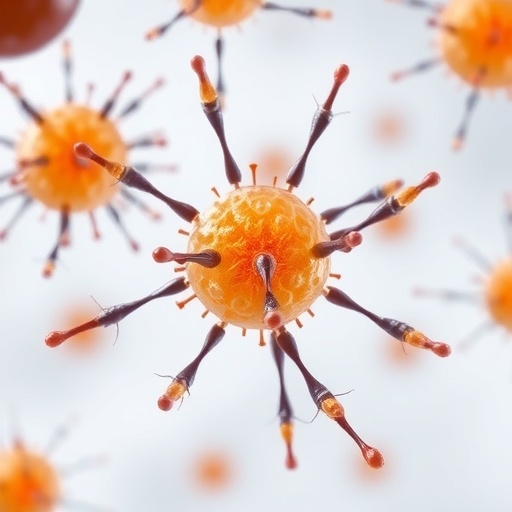A groundbreaking discovery by researchers at the LKS Faculty of Medicine, University of Hong Kong (HKUMed), has revealed the potent influence of dietary fatty acids on the human immune system’s capacity to combat cancer. This pioneering study illuminates how oleic acid (OA), a monounsaturated fatty acid prevalent in olive oil and nuts, significantly amplifies the anticancer activity of γδ-T cells—an extraordinary subset of immune cells recognized for their tumor-targeting prowess. Conversely, palmitic acid (PA), a saturated fatty acid commonly found in palm oil and fatty meats, was demonstrated to impair these immune cells’ effectiveness, shedding light on dietary fats’ contrasting roles in modulating cancer immunity.
For decades, the relationship between diet and cancer has been a complex puzzle, complicated by the diverse array of nutrients consumed and the intricate biochemical pathways they influence. Fatty acids, critical components of our diet essential for cell membrane integrity and energy metabolism, have now emerged as powerful modulators of immune function. The University of Hong Kong’s research team focused on γδ-T cells due to their unique ability to recognize and eradicate tumor cells without the need for antigen presentation, distinguishing them from conventional αβ-T cells. By modulating these cells’ function through dietary intervention, the potential to enhance cancer immunotherapy becomes a tangible prospect.
The team meticulously analyzed the effects of OA and PA on γδ-T cell function and found starkly opposing outcomes. Oleic acid was observed to bolster the immune surveillance capabilities of γδ-T cells, thus enhancing their antitumor activities. This enhancement is chiefly mediated via the upregulation of interferon-gamma (IFNγ), a critical cytokine that orchestrates immune responses against tumor cells. In contrast, palmitic acid exhibited an inhibitory effect, dampening IFNγ production and thereby weakening the immune cells’ ability to attack malignant tissues. The dualistic nature of these fatty acids underscores the profound influence diet can exert on cancer immunity at a cellular and molecular level.
This novel insight holds substantial promise for personalized cancer treatment regimens. By integrating dietary guidance focused on increasing OA intake and minimizing PA consumption, clinicians may improve the efficacy of γδ-T cell-based immunotherapies. Foods rich in oleic acid such as extra virgin olive oil, avocados, and various nuts could become essential adjuncts in cancer patient diets to optimize immune function. Moreover, this strategy could reduce treatment resistance and enhance survival outcomes for patients with challenging malignancies such as lung and liver cancers.
From a mechanistic perspective, the study delineates how PA disrupts γδ-T cell activity through lipid metabolism pathways that interfere with IFNγ signaling. Oleic acid, however, appears to restore and maintain the metabolic equilibrium necessary for γδ-T cells to exert their antitumor effects robustly. This metabolic reprogramming within immune cells introduces an exciting dimension to cancer immunotherapy, where targeting cellular metabolism via diet or pharmacological agents might synergize with existing treatments.
The implications of this research transcend simple nutritional advice; it suggests a paradigm shift in how dietary components can be harnessed to modulate immune cell landscapes in cancer patients. Currently, immunotherapies leveraging γδ-T cells show variable success rates, partly attributable to metabolic heterogeneity among patients. The modulation of fatty acid profiles presents a viable method to overcome these barriers, aligning nutritional status with desired therapeutic responses.
The potential for combined therapeutic modalities emerges from these findings. Dietary OA supplementation may work alongside immune checkpoint inhibitors or adoptive γδ-T cell therapies, amplifying their potency. Additionally, the identification of molecular targets involved in fatty acid-induced immune modulation opens avenues for developing new pharmacological agents to simulate OA’s beneficial effects or block PA’s detrimental influence, thereby expanding the arsenal of anticancer strategies.
This research team, led by Professor Tu Wenwei, is at the forefront of unraveling the complex interplay between diet, metabolism, and immune function in cancer. Their multidisciplinary collaboration across institutions reflects the global effort to refine and integrate nutritional science within precision oncology. By leveraging detailed understanding of lipid immunometabolism, they have uncorked a new approach that could enhance patient quality of life and treatment success.
In summary, this landmark study provides compelling evidence that fine-tuning dietary fatty acid intake significantly impacts γδ-T cell functionality and cancer immunotherapy outcomes. It empowers patients and clinicians alike with actionable knowledge: embracing oleic acid-rich foods and limiting palmitic acid consumption may be a practical, low-cost, and potent strategy to boost anticancer immunity. As this promising frontier unfolds, it heralds a future where diet becomes an integral component of personalized cancer care protocols.
With the growing global burden of cancer and the limitations of current therapies, such multifaceted approaches integrating nutrition and immunology are urgently needed. This discovery stands as a testament to the untapped potential lying within everyday foods, urging a reevaluation of diet’s role in cancer treatment paradigms. By marrying cutting-edge immunology with accessible dietary interventions, this research paves the way for more inclusive, effective, and holistic cancer therapies.
Subject of Research: Cells
Article Title: Oleic acid restores the impaired antitumor immunity of γδ-T cells induced by palmitic acid
News Publication Date: 3-Jul-2025
Web References:
References: Signal Transduction and Targeted Therapy, 2025.
Image Credits: The University of Hong Kong
Keywords: Health and medicine, Clinical medicine




